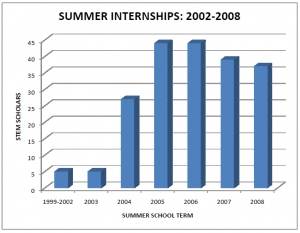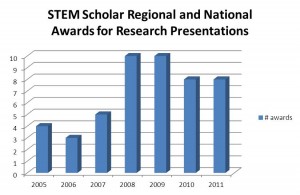RESEARCH
Participation in the LINC project is the doorway for students to become involved in impressive research internships at various universities and research organizations nationwide.
Each summer, approximately 35-40 LINC scholars participate in summer research internships at major U.S. institutions that include the University of California at Berkley, California Institute of Technology, Stanford University, Rice University, Johns Hopkins School of Medicine, NASA Goddard Space Center, Indiana University School of Medicine, and three Oklahoma Universities, including Langston. Students are taught to actively seek these internship positions, and they receive mentoring and other support from the LINC team and other STEM teaching staff.
Research Presentation Competition
In competitions ranging from the regional Oklahoma Research Day at Oklahoma’s Capitol to national competitions that include Beta Kappa Chi/National Institute of Science (NISBKX) Joint Meeting and Emerging Researchers National Conference (ERN), Langston’s LINC scholars have earned over 50 awards for presentations on their research projects. The field of competition has included students from organizations such as Cornell University, Howard University, Savannah State University, Spelman College, Southern University, University of DC, University of Georgia, University of North Carolina at Greensboro, and University of Texas at Austin, Shaw University, and Johns Hopkins School of Medicine.
The journey to national competition events takes a lot of work, and achieving top honors requires students to be at the top of their game, both in presentation skills and project content.
Each student who participates in summer research internships is required to develop a written accounting of the research project. Mentoring support by the LINC team and Langston’s STEM teaching staff help the young researchers hone the report on their work into an Abstract format that meets competitive guidelines for student research presentations. Abstracts are then submitted for consideration to various regional and national venues, where competition might come not only from HBCUs across the U.S., but also from comprehensive universities that have minority students in STEM disciplines.
Acceptance of the Abstract for formal presentation is the first hurdle, and over 100 Abstracts by Langston’s LINC scholars have made the cut. This group is now cleared to present the results of their research before a panel of judges who are professors and/or professionals in STEM related positions across the U.S. The LINC team, again with support from Langston’s STEM teaching staff, goes into overdrive to prep scholars on presentation style and content, and to prepare them for the oral critique they will get from presentation judges.
LINC scholar award winners have aced the process. The over 100 who earned a place at the competitive table are also to be congratulated for a job well done, as the margin that separates the winners from other competitors is often very small.
The list of Research Internship Abstracts is a sampling of those that were accepted on a competitive basis for presentation at competitive events.
Accomplishments
The increase in the number of students who participate in intense research experiences is itself a great accomplishment. Prior to LINC, the average number of research internships per year was 5; since LINC began, the increase has ranged from 400- 600%.
Langston’s LINC scholars hold their own among presenters from other HBCU’s and comprehensive universities that include University of California, Los Angeles; University of Arizona; Alabama State University; St. Johns University; and John Hopkins School of Medicine.
The increase in competitive awards for interns’ research presentations, from 1 or 2 intermittently , to between 8-10 annually, or a 450% increase.
Award Winners are listed on the linked document.
SWOT
We use a SWOT (Strengths, Weaknesses, Opportunities, and Threats) analysis to look back at lessons learned, and look ahead at how our process can be leveraged to broaden participation.



